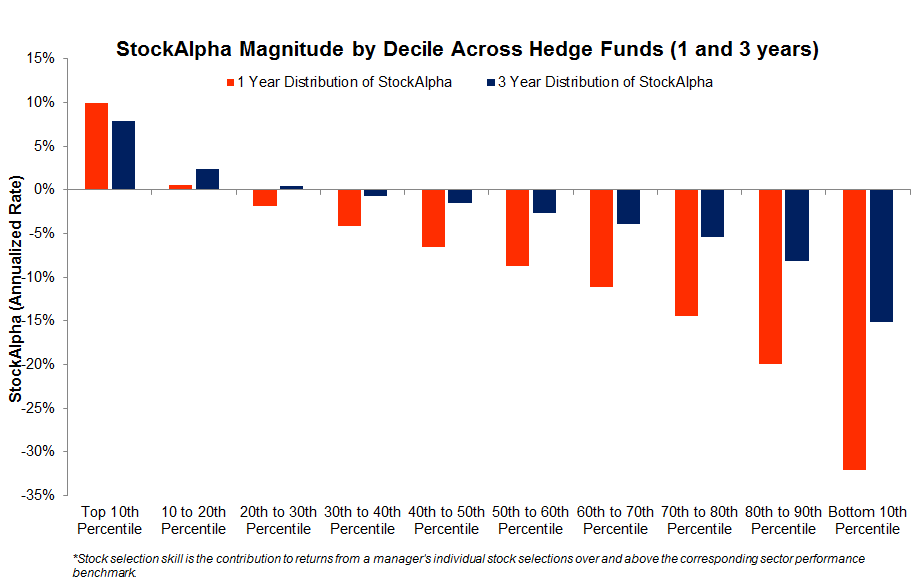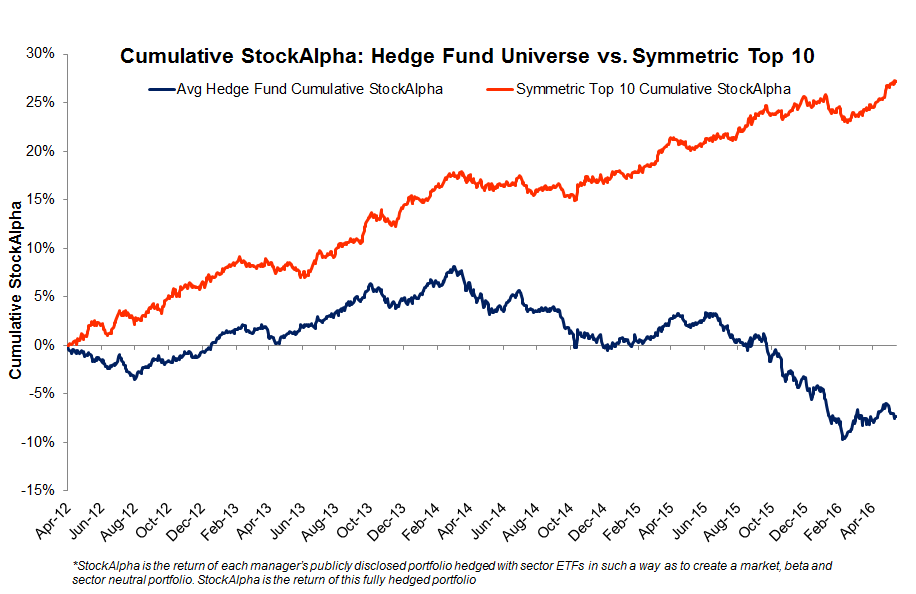Background
Symmetric provides the public reference-point for hedge fund investment skill. Some of the most sophisticated hedge fund allocators (hedge fund of funds, family offices, endowments) and financial advisors incorporate the analysis and rankings for due diligence and on-going monitoring of their hedge fund investments.
Many equity managers market themselves on their ability to pick individual stocks and are paid 2 and 20 for this skill, but it is often difficult to look at a hedge fund's overall returns and know how much of that came from stock picking.
Symmetric begins with a historical database of hedge fund holdings across a universe of more than one thousand funds. By observing how these holdings change and perform over time, we can assess the underlying skill of the investor and attribute it to their ability to pick stocks or sectors and size positions.
Symmetric's rankings are unique in the industry because they are based on isolating manager skill as opposed to returns. Overall hedge fund returns are driven by a number of factors including stock picking, sector picking, net long/short exposure, leverage, etc. All these factors drive returns, but managers are typically paid high fees of two-and-twenty for their stock picking skill or StockAlpha.
Symmetric's rankings are the first in the industry to isolate stock picking alpha and publicly rank hedge funds based upon that metric. The platform's analysis provides a framework to force-rank each hedge fund manager. The rankings illustrate the relative skill of equity long-short managers express, the most important of which is picking stocks.
The Quarterly Symmetric Stock Pickers Rankings recognizes those managers that are exceptional stock-pickers overall and by sector and the key investments themes that drive the industry. More importantly, it introduces the transparency with which ordinary investors can see the best possible publicly driven analysis of hedge fund decision-making and performance.
Methodology
Data
Symmetric begins with a historical database of hedge fund holdings across a universe of more than one thousand funds harvested from regulatory filings. Because hedge funds are required to file with the SEC, using regulatory filings to calculate rankings controls more effectively for survivorship bias compared to hedge fund analysis that depends upon self-reporting. By observing how these holdings change and perform over time, we can assess the underlying skill of the hedge fund and attribute it to their ability to pick individual stocks.
Measuring StockAlpha
StockAlpha measures a hedge fund manager's ability to pick stocks that outperform their corresponding sector. The commonly used Brinson-Fachler performance attribution methodology provides the foundation for the Symmetric approach. Intuitively, our approach is equivalent to calculating the performance of a portfolio in which each individual stock position is hedged with a sector index to create a market neutral and beta neutral portfolio. The return of that hedged portfolio corresponds to the manager's stock picking skill and is what we call StockAlpha.
The rough intuition behind how this is calculated is as follows: let us assume that a hedge fund manager held Apple stock for a quarter. If Apple rallied 10% over that quarter at the same time as when the technology sector rallied 7%, much of that 10% return may have been coming from the sector. The manager in this instance picked a great sector, which is worth ~7%, but the manager's ability to pick stocks that outperform its peers is ~3% (10% minus 7%). We define StockAlpha as one's ability to pick a security that outperforms its sector.
To calculate StockAlpha, a managers' long positions are first harvested from 13-F filings on a quarterly basis. The quarter-end sample forms the basis of a return-series that assumes the manager is able to trade in and out of the new and old positions at security prices at the end of each quarter. We calculate the return of the publicly disclosed portfolio and the resulting return series is called the "actual return of the publicly disclosed portfolio."
Next, we map each security in the publicly disclosed portfolio to a sector according to a standard industry mapping. We calculate the beta of each stock to its corresponding sector using daily price data with a one-year look-back. The betas adjust the exposure to each sector index required to hedge the individual stock. Based upon this mapping, we calculate the return of a "proxy portfolio" that captures how much of the "actual portfolios" returns come from the sectors that those stocks happened to be in.
The difference between the actual return of the publicly disclosed portfolio and the proxy portfolio each quarter is the StockAlpha of the manager for the quarter. The sum of the trailing four or twelve quarters, respectively, are the StockAlpha for the year or the past three years.
The Symmetric Top Managers - Ranking the Top Skilled Investors
StockAlpha Across the Hedge Fund universe
Stock picking is difficult. The distribution of StockAlpha shows that over the past three years just over half of managers have generated positive stock picking skill. StockAlpha has meaningfully declined over the past few quarters, though. Our 3Q - 2015 report indicated 50% of managers had produced positive StockAlpha over the trailing twelve months. This was followed by a decline in 4Q - 2015 to 30% of managers who delivered positive StockAlpha over the previous twelve months. The 1Q - 2016 report, however, illustrated a precipitous drop in realized skill over the prior twelve months. The stock-picks of 90% of hedge fund managers had delivered negative StockAlpha and underperformed on a market, beta, and sector adjusted basis. For the trailing twelve months, just 20% of managers have demonstrated positive StockAlpha; this means that only 20% of managers were able to pick stocks that outperformed their sectors. This presents an improvement in skill from our Q1 report.

Symmetric Top Managers Cumulative StockAlpha vs. HF universe Cumulative StockAlpha
The Symmetric Top Managers comprise the top ranked long-short equity managers. We force-rank the entire Symmetric universe according to their realized StockAlpha year to date, 12 months back and three years back. The list is further adjusted to reflect those whose StockAlpha has not only the greatest magnitude, but also the greatest consistency over each period.
The following chart shows the cumulative StockAlpha for the Symmetric Top Managers vs. cumulative StockAlpha for the entire hedge fund universe. The chart demonstrates the magnitude of dispersion between the best and most consistent stock pickers and the average stock pickers. The Symmetric Top Managers have added over 5.6% of StockAlpha over the past year. The average hedge fund would return negative StockAlpha after fees.

Overall StockAlpha - 2nd Quarter 2016 Symmetric Ten
| Name | Founder | 3 Yr StockAlpha Magnitude | 1 Yr StockAlpha Sharpe |
|---|---|---|---|
| Echo Street Capital | Gregory Poole | 6.3% | 2.2 |
| Endicott Management Company | Wayne Goldstein, Robert Usdan | 6.2% | 1.7 |
| Castine Capital Management | Paul Magidson | 7% | 1.3 |
| Egerton Capital | Jeffrey Blumberg | 2.5% | 1.1 |
| Long Pond Capital | John Khoury | 11% | 1.1 |
| Mendon Capital Advisors | Anton Schutz | 7.2% | 1.1 |
| Tyrus Capital S.A.M. | Xavier Portes | 11% | 1.1 |
| Conatus Capital Management Lt | David Stemerman | 4.1% | 1.0 |
| SPO Advisory Corp | John Scully | 2.6% | .7 |
| Highfields Capital Management | Jonathon Jacobson | 4.1% | .6 |
Key Highlights - 2nd Qtr 2016 vs. 1st Qtr 2016
Funds that stayed on the list:
Echo Street Capital Management Helped by SRC and HPY
Endicott Management: Helped by positions in NBBC, WFBI and BANC
Egerton Capital: Helped by a position TWC and LUV
Many strong managers remained off the list. We required that managers have a positive start to the year on a StockAlpha basis, and many strong managers, including Viking Global, Whale Rock, Baker Brothers, Third Point, among others were unable to stanch the losses that stemmed from the volatile market in 2016. Moreover, not only did their positions decline, they underperformed on a market, sector and beta adjusted basis, so the poor start to the year undermined their positive twelve and thirty-six month track records of top StockAlpha.
The specific circumstances of each manager are different, but it may be that the effects of hedge fund crowding in certain positions have taken their toll. As earlier reports have shown, crowded hedge fund positions tend to underperform dramatically in volatile markets such as we see today. The performance of the Symmetric Hedge Fund Concentration index and crowding scores provide a lens through which to see these effects. We have considered managers' exposures on a position level basis and relative to peers through past research. In addition, we also profile individual managers according to the exposure to crowded positions, the effect on their portfolio overall, their relative positioning according to peers, and their overlap with other managers. These are available through the enterprise service at Symmetric.io.
Symmetric Rankings - Recent Activity
What have the Skilled Investors been doing?
Skilled investors separate themselves from the hedge fund universe through their stock-picks. Unlike the picks of the universe overall, these picks are those that drive the top performers. We highlighted the positions skilled investors initiated, accumulated and exited recently.
Symmetric Top Managers - Top Five Recent New Positions
| Rank | Ticker | Name of Stock | Fund(s) | Average Position Size | 2016 QTD Stock-Return |
|---|---|---|---|---|---|
| 1 | MAR | Marriott International | Highfields | 4.9% | -4.9% |
| 2 | GOOG | Alphabet | Egerton | 4.6% | -3.8% |
| 3 | PEP | PepsiCo Inc | Highfields | 2.1% | 1.6% |
| 4 | SBAC | SBA Communications | SPO Advisory | 3.4% | -0.28% |
| 5 | DIS | Walt Disney Company | highfields | 1.6% | 1.1% |
Symmetric Ten's Top Five Recent Increased Positions
| Rank | Ticker | Name of Stock | Fund(s) | Average Position Size | 2Q16 Stock-Return |
|---|---|---|---|---|---|
| 1 | V | Visa | Echo, Egerton | 4.1% | 1.9% |
| 2 | YDKN | Yadkin Financial | Mendon | 10% | 5.6% |
| 3 | DLTR | Dollar Tree | Conatus | 5.7% | -3% |
| 4 | FBP | First Bancorp | Castine | 5% | 30% |
| 5 | LBTYK | Liberty Global | SPO Advisory | 14% | 0.1% |
